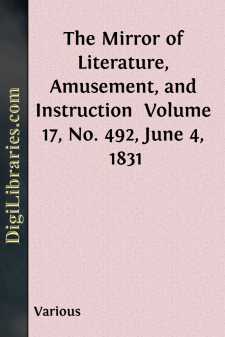Categories
- Antiques & Collectibles 13
- Architecture 36
- Art 48
- Bibles 22
- Biography & Autobiography 813
- Body, Mind & Spirit 142
- Business & Economics 28
- Children's Books 15
- Children's Fiction 12
- Computers 4
- Cooking 94
- Crafts & Hobbies 4
- Drama 346
- Education 46
- Family & Relationships 57
- Fiction 11828
- Games 19
- Gardening 17
- Health & Fitness 34
- History 1377
- House & Home 1
- Humor 147
- Juvenile Fiction 1873
- Juvenile Nonfiction 202
- Language Arts & Disciplines 88
- Law 16
- Literary Collections 686
- Literary Criticism 179
- Mathematics 13
- Medical 41
- Music 40
- Nature 179
- Non-Classifiable 1768
- Performing Arts 7
- Periodicals 1453
- Philosophy 64
- Photography 2
- Poetry 896
- Political Science 203
- Psychology 42
- Reference 154
- Religion 513
- Science 126
- Self-Help 84
- Social Science 81
- Sports & Recreation 34
- Study Aids 3
- Technology & Engineering 59
- Transportation 23
- Travel 463
- True Crime 29
The Mirror of Literature, Amusement, and Instruction Volume 17, No. 492, June 4, 1831
by: Various
Categories:
Description:
Excerpt
THREE BOROUGHS
Proposed to be wholly disfranchised by the REFORM BILL.
1. DUNWICH. 2. OLD SARUM. 3. BRAMBER.
THREE BOROUGHS:
1. DUNWICH, SUFFOLK.
2. OLD SARUM, WILTS.
3. BRAMBER, SUSSEX.
Proposed to be wholly disfranchised by "the Reform Bill."
We feel ourselves on ticklish—debateable ground; yet we only wish to illustrate the topographical history of the above places; their parliamentary history must, however be alluded to; but their future fate we leave to the 658 prime movers of government mechanics. Mr. Oldfield's History of the Boroughs, the best companion of the member of parliament, shall aid us: instead of companion we might, however, call this work his family, for there are six full-grown octavo volumes, which would occupy a respectable portion of any library table.
Dunwich is a market town in the hundred of Blything, Suffolk, three and a half miles from Southwold, and one hundred from London. It was once an important, opulent, and commercial city, but is now a mean village. It was also an episcopal see, but William I. transferred the see to Thetford, and thence to Norwich. Dunwich stands on a cliff of considerable height commanding an extensive view of the German Ocean, and we learn that its ruin is owing chiefly to the encroachments of the sea. It is a poor, desolate place, as the cut implies. Mr. Shoberl, in the Beauties of England and Wales, tells us "seated upon a hill composed of loam and sand of a loose texture, on a coast destitute of rocks, it is not surprising that its building shall have successively yielded to the impetuosity of the billows, breaking against, and easily undermining the foot of the precipice." Certainly not, say we; and it is equally un-surprising that seven out of its eight parishes having been long ago destroyed, their political consequence should not exist beyond their extermination. Mr. Oldfield, whom we remember to have often met, was a man of jocose turn, and he has not spared Dunwich his whip of humour, for, speaking of its gradual decay by the sea, he says—"the encroachment that is still making, (1816) will probably, in a few years, oblige the constituent body to betake themselves to a boat, whenever the king's writ shall summon them to the exercise of their elective functions; as the necessity of adhering to forms, in the farcical solemnity of borough elections, is not to be dispensed with."
We must be brief with its representative and political history. "Out brief candle!" It has sent members since the 23rd Edward I. Bribery and other irregularities against the sitting members in procuring votes were proved in 1696: in 1708, Sir Charles Bloyce, one of the bailiffs was returned, but upon a petition proving bribery, menaces, treating, &c. this was proved to be "no return:" Sir Charles was declared not capable of being elected, "as being one of the bailiffs; nor had the other bailiff alone any authority to make a return, the two bailiffs making but one officer." In 1722 another bribery petition was presented, but the affair was made up, and the complaint withdrawn....












